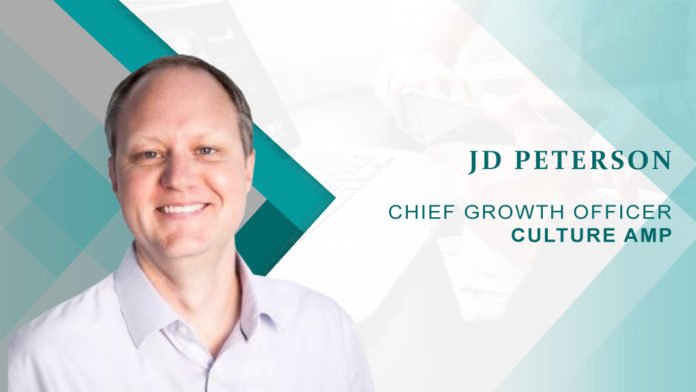1. Tell us about your role in Culture Amp?
My title at Culture Amp is Chief Growth Officer. Just like you would guess, my primary focus is helping our business grow. Financial metrics, such as revenue growth, are certainly at the heart of it, but we also think about “growth” in terms of people. How are we helping our customers grow? How are we growing our own people?
Another way to describe my role is that I essentially lead our go-to-market strategy. I get to play across sales, marketing, customer service, and more.
2. Can you tell us about your personal journey into this market?
I’m a long time operator in the world of SaaS, even before it was referred to that way! I have served in a variety of roles at successful SaaS startups: Marketo, Zendesk, and Trello. When I decided to join Culture Amp more than two years ago, I was really looking for three things: a company that was early stage but had established product-market fit, a company with a great leader and culture, and an opportunity to get into the HR Tech space. I have long believed that People and Culture are the greatest assets in companies, and have also seen too many examples of broken workplaces and companies that don’t put their people and culture first. I was motivated by Culture Amp’s mission to change this and help make a better world of work.
3. What advice would like to give to the upcoming HRTech startups?
It’s the same advice I would give to most startups.
Find common problems and offer simple solutions for them.
Now that is way easier said than done, but it has to start there. The other piece of advice I would give is to think about people and culture problems, not “HR” problems per se. The role of HR is going through a transformation. Topics and issues that were once solely in the domain of HR are often landing in the exec suite and with front-line managers. The more you can bring users outside of traditional HR roles into your product, the greater success you will have at those products being adopted and stickier within organizations.
4. What work related hack do you follow to enjoy maximum productivity?
Work from home Wednesday! I find it is a great way to break up the week and give me some space for thinking and highly productive work time. Also, I would be remiss if I didn’t give a shout-out to one of my former employers and say that you can’t beat a good Trello board to keep track of what you need to get done.
5. Can you tell us about your team and how they support you?
My team is a collection of amazing people who are all People Geeks! They’re really passionate about our company mission and about improving themselves and their teams every day. They support me by taking ownership in all that they do and being accountable for the results. They also support me by allowing me to be my authentic self and not always staying in the traditional manager box. I like to think of us as partners in this sense.
6. Which book(s) are you reading these days?
Range by David Epstein. It’s about the power of generalists and why they triumph in an increasingly specialized world. I’m learning so many things reading this, but it is also validating a lot of things I have believed and experienced but didn’t have the research or data to back up!
7. Can you give us a glimpse into the applications you use on your phone? Which ones do you use everyday?
I’m pretty basic here. I’m most commonly on Slack and I listen to a ton of podcasts. Trello as mentioned earlier. My social media fix comes from Twitter, Instagram, and LinkedIn.
8. How do you think technology is changing the HR sector?
The HR industry has evolved immensely, and mostly as a direct result of technology. In 2019, it’s hard to believe that it was the norm for companies to handle everyday HR tasks like payroll, time-off, and performance reviews manually.
HR Tech has enabled companies to focus less on admin and more on empowering staff and increasing a strong workplace culture and employee engagement. Companies now have access to vast datasets that back up intangible yet crucial aspects of the employee experience, such as employee happiness, productivity, and engagement. It’s been revolutionary for companies developing Culture First workplaces, and for creating atmospheres that employees thrive in.
9. How has integration of technology contributed in improving the work culture of an organization?
Thanks to HR Tech, companies of all sizes across all industries now have greater access and insight into the exact ingredients that build positive work cultures. Implementing a strong culture quickly is no easy feat, but the right technology makes the process that much faster. Companies now have more ways to accurately measure how work culture can affect employee performance, and the ability to significantly improve recruiting and retention efforts.
For example, companies can now use HR Tech, such as Culture Amp, to collect data-driven insight that helps improve work culture and employee engagement across departments, regions, and other customizable categories. It’s a dramatic shift in the way global and local companies approach the culture they create.
10. Can you explain why employee engagement is getting a lot of focus from employers?
Higher employee engagement is directly tied to the success of a company: It can lead to higher online ratings (a la Glassdoor), Net Promoter Scores (NPS), and increased employee retention rates.
Culture Amp found that employee engagement can directly affect companies’ bottom lines. In a 2017 Culture Amp report, we even found that higher employee engagement is directly related to share price growth.
As more employers realize the benefits of high employee engagement, more companies will be prioritizing programs, tools (such as Culture Amp) and technologies to measure, harness and increase engagement.
11. How does your platform help in employee retention?
Culture Amp uses predictive analysis to show which employee groups are most at-risk of leaving –and the reasons why –so employers can take immediate action. These predictions are calculated through machine learning algorithms and are based on insights from over three million employees globally. Culture Amp tracks patterns across various engagement surveys to indicate whether an employee is in danger of leaving. When the platform identifies these patterns, it alerts managers and suggests actions to help retain employees.
Predicting which employees will leave your company – and when – is quite powerful for any HR or People & Culture leader. However, predicting why these employees will leave can arm organizations with the data necessary to quickly change and improve their employee retention efforts.
12. How does your employee feedback system benefit organizations?
The “rearview mirror” annual performance review model is outdated and not relevant to today’s fast-moving, demanding workforce. We help employers and employees continuously look forward by providing real-time, 360° feedback opportunities.
Learning faster through feedback is one of Culture Amp’s core values. We take employee feedback seriously, and believe it’s one of the most important factors in creating a Culture First organization. Our platform enables our customers to collect, understand and act on feedback to make their companies better places to work.
The most beneficial part of our feedback system is that we help companies actually take action based on the feedback they receive. Collecting this feedback is the first step: it’s then fed back to managers through easy-to-understand data that highlights which employee groups are happy and productive, and which ones are struggling.
Managers are empowered to act and help groups in their organizations who may be unhappy or disengaged in their work. The platform also offers suggestions on how managers can effectively action the data they’re receiving from the collected feedback, helping employers create a better place to work every step of the way.
13. How do you prepare for an AI-centric world?
In HR Tech specifically, AI is creating vast opportunity. A majority of HR Tech platforms use variations of AI and machine learning to effectively analyze data.
For example, our predictive analytics tools uses machine learning to make accurate predictions based on millions of data points, and then the data is used to give managers feedback and suggested actions. We’ve built Culture Amp’s platform to leverage and lean on AI for data collection to create better places to work now and in the future.
At Culture Amp, we also believe that machine learning technology and AI should be used for good. This comes back to Culture Amp’s mission of amplifying what people are capable of being at work. We take careful steps to ensure data and insights are aggregated toward the goal of creating positive, more inclusive outcomes versus alienating or excluding certain groups of employees.
14. What are the major developments you are planning at Culture Amp?
Earlier this month we announced a Series E, $82 million USD funding raise. This investment will allow us to continue our mission to make the world of work better for 100 million people globally.
From a product point of view, Culture Amp recently introduced Foresight EngineTM. The feedback gathered from our individual employee surveys syncs with the Foresight Engine to ultimately empower HR, people and culture leaders to predict employee outcomes, along with offering recommended areas to take action.
Culture Amp is also deeply committed to helping companies progress their diversity and inclusion initiatives. At our second annual Culture First event in July, we announced open enrollment for the Diversity & Inclusion Starter Kit — the first of its kind in the industry. The D&I kit is free for all companies, Culture Amp customer or not, beginning in October. This innovative program will allow companies of all sizes across the globe to get started on their diversity and inclusion initiatives and benefit from the learnings of our 2,500-company-strong customer base.
We have plans to expand into new markets soon, which our global team is amped about — so you’ll hear more from Culture Amp soon no matter which corner of the globe you live in.

JD Peterson Chief Growth Officer, Culture Amp.
Silicon Valley veteran with several years of leadership positions in high-growth companies. JD Peterson is a Chief Growth Officer at Culture Amp. He has a very diverse background with recent Executive roles in Marketing, Product, and CRO/CEO. He loves startup culture, growth hacking, team building, brand building, product marketing, data-driven decision making, and keeping the customer at the center of it all.












